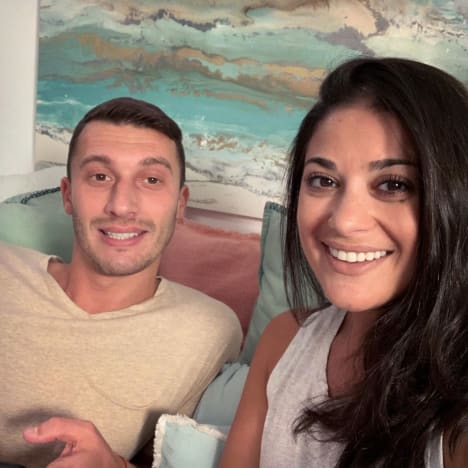Yes.
I’m admitting it for all of you to hear.
I’m obsessed with 90 Day Fiancé.
But it’s actually worse than that. I’m obsessed with the spin-off of 90 Day Fiancé, called 90 Day Fiance: Happily Ever After?
For those who’ve never seen the show, it’s about people in America who fall in love with someone from another country, and they order something called the K-1 Visa which allows the foreign party to come to America for 90 days so both parties can get to know each other. And if they want to both stay in the United States, they have to get married. Otherwise, the foreign partner has to go back to their country forever.
The show works because it has a goal “to get married.” It has stakes. “If you don’t get married, you’ll never be together again.” And it has urgency. They have to figure out if they want to spend the rest of their lives together within 90 days.
The show also has a dark underbelly in that we’re constantly wondering whether the person coming to America is coming because they like the person, or is it to just get married in order to get American citizenship? Once they have the green card, will they disappear (and yes, many do).
The spinoff show that I’m binging (“Happily Ever After”) tracks these couples after they’ve gotten married. And here’s where today’s two screenwriting lessons kick in.
What I’ve noticed is that, from season to season, if your storyline doesn’t have THESE TWO ESSENTIAL ELEMENTS, they don’t let you come back. These components are 1) An active pursuit and 2) Conflict.
What does that mean, an active pursuit? That means that a person IS TRYING TO ACHIEVE SOMETHING. For example, take Russ, a vanilla Midwestern engineer, and Paola, a spicy Columbian. The two originally lived in Oklahoma. But Paola couldn’t stand it there. She had big dreams of being a model. So she demanded that the two move to Miami to pursue her modeling career.
This ensured, during the entire season, that the couple had an active pursuit. We want to watch because we want to see if Paola succeeds or fails at her venture. Conversely, what would’ve happened had they stayed in Oklahoma? Nothing. They wouldn’t be pursuing anything and, therefore, their everyday lives would be boring to watch.
The same principle applies to screenwriting. You want your characters going after something in their life. And it doesn’t have to be a job. In fact, in one of the greatest screenplays ever, American Beauty, Lester gets laid off. But he begins a pursuit to, for the first time in his life, do whatever the fuck he wants and be happy. Just like Paola’s modeling pursuit, Lester’s adventure is either going to end in success or failure and we want to stick around to find out which.
There is no American Beauty if Lester keeps his job and goes to work every day. Drama is about leaving the status quo behind and pursuing something bigger. If your narrative is sitting inside a big fat status quo sandbox, we’re going to be bored.
Let’s look at another couple, cute and smiley American, Loren, and tall and athletic Israeli, Alexi. In their first season, after having gotten married on the original show, they decided to have a second wedding in Israel for people who weren’t able to make it to the American wedding. The whole season felt forced but it gave the characters something to actively pursue. They had to plan this second wedding. Every episode had purpose because they had to plan plan plan.
However, in the following season, they didn’t have anything to pursue. There was a subplot of Loren doing some charity work but there was no big strong goal driving either of the characters. So what happened? They weren’t invited back for another season. That’s what happened.
It’s the same deal in screenwriting. If you don’t give your characters something big they’re pursuing, you don’t get to come back another season. I talked about this last week with Unorthodox. The main character didn’t just get to Germany and chill out. She began pursuing this music opportunity. If you don’t include that, your character isn’t going to have anything to do.
Has that ever happened to you? Where you don’t know what to write next? You have your hero but you have no idea what scene you’re going to write for them? If that’s happening, you haven’t given them an active pursuit. When you have an active pursuit, there is ALWAYS SOMETHING FOR YOUR CHARACTER TO DO. For example, if they’re trying to be a director, they first need to get a script, then they need to get a camera, but they don’t have money for a camera so they first have to make some money, then they need to location scout, then they need to cast people. A clear active pursuit will ensure that your hero always has something to do next.
The second thing you need is conflict. Active pursuits are great. But a pursuit is boring if everything goes smoothly. It’s the constant obstacles that create conflict which is what makes watching the pursuit fun.
Going back to Russ and Paola, Russ is super conservative whereas Paola is risqué. She wants to push the envelope with these sexy modeling shoots. Russ, meanwhile, is constantly telling her to pull back. She’s going too far. This push-pull conflict at the center of her pursuit is what drives the drama.
Now let’s be real here. This is surface-level reality show conflict. But the idea of what they’re doing is directly applicable to screenwriting. You always want conflict in your characters’ pursuit. Whatever the journey is, you need to make it as hard as possible for the characters to get there. Conflict is the tool that’s going to allow that.
In Loren and Alexi’s first season, there was some heavy conflict built around Loren ordering strippers for her bachelorette party. There were constant fights about that decision. Again, this is basic reality show fluff. But you can see how even basic reality show fluff conflict is better than no conflict. Cause in the following season, the two didn’t have any conflict with each other and they quickly became the most boring couple to watch.
When you’re writing, one thing that should constantly be on your mind is, how can I make this harder on my hero? Making things harder is what creates conflict. And you can make it harder with other characters. You can make it harder with unexpected developments (they lose the wedding venue the day before the wedding). Be creative. But whatever you do, don’t make it easy. Easy = boring = Alexi and Loren = not invited back for next season.
To wrap things up, I hope I’ve achieved two things. One, to introduce 90 Day Fiance to those who haven’t seen it. I’m warning you, you’re going to become obsessed so apply social distancing laws to your television. And two, the power of active pursuits and conflict in storytelling. Whether it’s a reality show, a TV drama, a short film, a snapchat story, or a feature screenplay, these two things are going to elevate your writing above the majority of writing out there. I promise you that! So get to writing. Or watching 90 Day Fiance – I’m okay with either.



